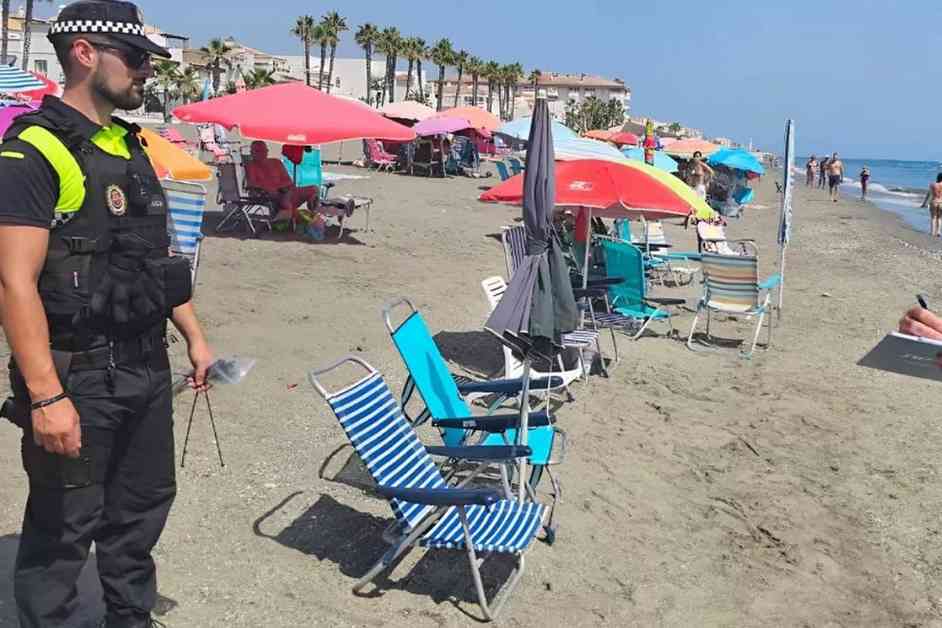Spanish authorities have taken a firm stance against selfish beachgoers who hog public space by confiscating beach loungers and umbrellas from tourists who reserve prime spots but abandon them, sometimes even before sunrise. Local governments in popular Spanish tourist destinations, including the mainland, Balearic Islands, and Canary Islands, have implemented fines for beachgoers who leave their loungers and umbrellas unattended while they are away, such as during lunch or naps.
According to reports, confiscated items are taken to the local police station, and tourists must pay a fine equivalent to £210 to reclaim them. This crackdown on irresponsible beach behavior complements recent efforts by Greek authorities to address the issue of beach overcrowding. In a similar move to Spain, Greece imposed over 350,000 euros in fines within just five days on businesses illegally occupying beach space with sunbeds and tables.
Spain’s new regulations mark the most recent development in a series of measures aimed at tourists this summer. However, these actions have generated significant controversy, with locals pushing back against overtourism. Demonstrators have staged protests on Majorca beaches, demanding the return of these public spaces to residents.
Subheadings:
Local Crackdown on Beach Behavior
Protests Against Overtourism
The Battle for Spain’s Beloved Beaches
New regulations in coastal regions prohibit the placement of chairs, sunbeds, or umbrellas on beaches before 9 AM to facilitate daily cleaning operations. Social media posts have depicted Malaga police enforcing these rules by removing beach furniture and police vehicles loaded with seized beach chairs and umbrellas. A TikTok user expressed frustration with the situation, highlighting the double standard in Spain’s controversial squatting laws.
While some individuals support the new regulations, others have expressed frustration with the restrictions. BenidormLovers, a Facebook page dedicated to Spanish tourism, acknowledged tourists’ frustration with prioritizing sleep or leisurely breakfasts over enjoying the beach. The post noted that the practice of reserving beach space with chairs and umbrellas has been ongoing for years but is now being addressed by local councils.
Spanish media outlets have reported that new regulations prohibit the unrestricted occupation of public land, specifically addressing the practice of claiming beach space with chairs, deckchairs, and umbrellas from the early morning hours. Local laws stipulate that umbrellas, chairs, or deckchairs left unattended for over three hours may be removed, with municipal authorities having the right to take action.
Protests against overtourism have intensified, with a demonstration organized under the slogan “Enough! Let’s put limits on tourism.” Protesters demanded a new economic model that would decrease the number of annual tourists, carrying signs with messages like “Barcelona is not for sale” and “Tourists go home.” The movement’s primary concerns include rising housing costs and the impact of tourism on local businesses and working conditions.
In 2017, Barcelona implemented a moratorium on hotel licenses and imposed restrictions on hotel rooms to mitigate the overwhelming influx of tourists. Rents in tourist destinations like Barcelona and Madrid surged 18 percent in June compared to the previous year, according to Idealista. Anti-tourism protests have also occurred on Majorca’s beaches this summer, advocating for the return of these spaces to local residents.
The battle for Spain’s beloved beaches intensifies as the summer season peaks, with tensions rising and protests escalating. The delicate balance between tourism, a vital economic driver, and the quality of life for residents is increasingly under strain. The future of these iconic destinations hangs in the balance as the fight for public space in Spain’s tourist hotspots continues to unfold.













